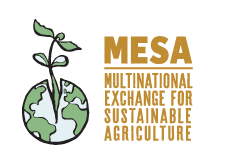On Friday October 7th, our program the Bay Area Farmer Training Program hosted a workshop open to the public on fundraising, credits and loans in the non-profit sector focused in organizations working inside the Food Justice Movement.
We had the pleasure to host three guest speakers Gavin Raders, co-founder and Executive Director of Planting Justice, Leah Atwood, Director of Programs and Partnerships at the Multinational Exchange for Sustainable Agriculture, MESA, and Esperanza Pallana, Member of Strategic Initiatives Team of Northern California Community Fund Loan NCCFL. They shared their experiences leading organizations committed to work for food justice in the Bay Area.

se terrains and how to leverage our strengths. Meanwhile she works hard at the NCCLF to advocate for programs to facilitate land acquisition by people of color, especially women.
Gavin Raders shared with us part of the history of Planting Justice: “When we began, it was a time when we could work a lot for free, we did not have kids, paid cheap rent, so we could take a lot of risks.” At the beginning Gavin and his partner and co-founder, Haleh Zandi, began canvassing and building gardens. With time they learned that asking for money takes a lot of practice and energy and that canvassing was more effective with a carefully crafted pitch that contained the following a) description of the problem, b) possible solutions, c) example of successes using the proposed solutions, d) possible strategies, and finally d) asking for support. Then, be silent and wait for an answer. Maybe at first people don’t donate, but once a relationship of confidence and trust is established, they often do.
He explained that applying for grants can be a good source of support for non-profits, but it is better to not be dependent on grants and to be self sufficient an organization needs to generate it’s own funding. He said that mainly there are three big groups of grants: local foundations, national foundations and government grants. Local and national foundation grants are low and medium in quantity and accessible for small and beginning organizations, and government grants can bring more funds, but often require experience.
Leah Atwood pointed out that the collaboration between organizations is crucial to success and that “definitely funding is not equally accessible, it is challenging for a small organization to compete with large ones who have staff dedicated only to fundraising and development, but strategic cooperation between organizations can help.” She emphasized the importance of the construction of trust not only between non-profits and donors, but between non-profits themselves: “When organizations can align their values and strategies and larger, experienced non-profits support smaller, younger non-profits; we can move the work forward, re-distribute resources, and uplift each other instead of competing. We want to re-distribute financial resources from foundations and increase access for those facing barriers, but at the same time, we prefer to be accountable to our members and our network rather than big funders.” To this end, MESA provides ongoing programing with education programs, exchange services, participatory research tools and a seed saving farm to build the movement. Planting Justice builds gardens, has a 5-acre farm and nursery, and offers educational programs. The goal is to diversify your support streams, but still stay focused so the work can be effective.
“definitely funding is not equally accessible, it is challenging for a small organization to compete with large ones who have staff dedicated only to fundraising and development, but strategic cooperation between organizations can help.”
Our students took many lessons and useful information that will help them to strengthen their own projects from this workshop, and we at MESA hope that these open spaces every time get stronger and more useful to our communities.


